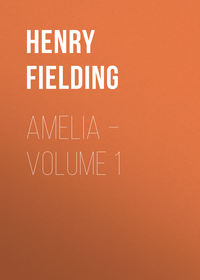 полная версия
полная версияHistory of Tom Jones, a Foundling
But though Mrs Miller did not refrain from a short expostulation in private at their first meeting, yet the occasion of his being summoned downstairs that morning was of a much more agreeable kind, being indeed to perform the office of a father to Miss Nancy, and to give her in wedlock to Mr Nightingale, who was now ready drest, and full as sober as many of my readers will think a man ought to be who receives a wife in so imprudent a manner.
And here perhaps it may be proper to account for the escape which this young gentleman had made from his uncle, and for his appearance in the condition in which we have seen him the night before.
Now when the uncle had arrived at his lodgings with his nephew, partly to indulge his own inclinations (for he dearly loved his bottle), and partly to disqualify his nephew from the immediate execution of his purpose, he ordered wine to be set on the table; with which he so briskly plyed the young gentleman, that this latter, who, though not much used to drinking, did not detest it so as to be guilty of disobedience or want of complacence by refusing, was soon completely finished.
Just as the uncle had obtained this victory, and was preparing a bed for his nephew, a messenger arrived with a piece of news, which so entirely disconcerted and shocked him, that he in a moment lost all consideration for his nephew, and his whole mind became entirely taken up with his own concerns.
This sudden and afflicting news was no less than that his daughter had taken the opportunity of almost the first moment of his absence, and had gone off with a neighbouring young clergyman; against whom, though her father could have had but one objection, namely, that he was worth nothing, yet she had never thought proper to communicate her amour even to that father; and so artfully had she managed, that it had never been once suspected by any, till now that it was consummated.
Old Mr Nightingale no sooner received this account, than in the utmost confusion he ordered a post-chaise to be instantly got ready, and, having recommended his nephew to the care of a servant, he directly left the house, scarce knowing what he did, nor whither he went.
The uncle thus departed, when the servant came to attend the nephew to bed, had waked him for that purpose, and had at last made him sensible that his uncle was gone, he, instead of accepting the kind offices tendered him, insisted on a chair being called; with this the servant, who had received no strict orders to the contrary, readily complied; and, thus being conducted back to the house of Mrs Miller, he had staggered up to Mr Jones’s chamber, as hath been before recounted.
This bar of the uncle being now removed (though young Nightingale knew not as yet in what manner), and all parties being quickly ready, the mother, Mr Jones, Mr Nightingale, and his love, stept into a hackney-coach, which conveyed them to Doctors’ Commons; where Miss Nancy was, in vulgar language, soon made an honest woman, and the poor mother became, in the purest sense of the word, one of the happiest of all human beings.
And now Mr Jones, having seen his good offices to that poor woman and her family brought to a happy conclusion, began to apply himself to his own concerns; but here, lest many of my readers should censure his folly for thus troubling himself with the affairs of others, and lest some few should think he acted more disinterestedly than indeed he did, we think proper to assure our reader, that he was so far from being unconcerned in this matter, that he had indeed a very considerable interest in bringing it to that final consummation.
To explain this seeming paradox at once, he was one who could truly say with him in Terence, Homo sum: humani nihil a me alienum puto. He was never an indifferent spectator of the misery or happiness of any one; and he felt either the one or the other in great proportion as he himself contributed to either. He could not, therefore, be the instrument of raising a whole family from the lowest state of wretchedness to the highest pitch of joy without conveying great felicity to himself; more perhaps than worldly men often purchase to themselves by undergoing the most severe labour, and often by wading through the deepest iniquity.
Those readers who are of the same complexion with him will perhaps think this short chapter contains abundance of matter; while others may probably wish, short as it is, that it had been totally spared as impertinent to the main design, which I suppose they conclude is to bring Mr Jones to the gallows, or, if possible, to a more deplorable catastrophe.
Chapter ix. – Containing love-letters of several sorts
Mr Jones, at his return home, found the following letters lying on his table, which he luckily opened in the order they were sent.
LETTER I“Surely I am under some strange infatuation; I cannot keep my resolutions a moment, however strongly made or justly founded. Last night I resolved never to see you more; this morning I am willing to hear if you can, as you say, clear up this affair. And yet I know that to be impossible. I have said everything to myself which you can invent. – Perhaps not. Perhaps your invention is stronger. Come to me, therefore, the moment you receive this. If you can forge an excuse I almost promise you to believe it. Betrayed too – I will think no more. – Come to me directly. – This is the third letter I have writ, the two former are burnt – I am almost inclined to burn this too – I wish I may preserve my senses. – Come to me presently.”
LETTER II“If you ever expect to be forgiven, or even suffered within my doors, come to me this instant.”
LETTER III“I now find you was not at home when my notes came to your lodgings.
The moment you receive this let me see you; – I shall not stir out; nor shall anybody be let in but yourself. Sure nothing can detain you long.”
Jones had just read over these three billets when Mr Nightingale came into the room. “Well, Tom,” said he, “any news from Lady Bellaston, after last night’s adventure?” (for it was now no secret to any one in that house who the lady was). “The Lady Bellaston?” answered Jones very gravely. – “Nay, dear Tom,” cries Nightingale, “don’t be so reserved to your friends. Though I was too drunk to see her last night, I saw her at the masquerade. Do you think I am ignorant who the queen of the fairies is?” “And did you really then know the lady at the masquerade?” said Jones. “Yes, upon my soul, did I,” said Nightingale, “and have given you twenty hints of it since, though you seemed always so tender on that point, that I would not speak plainly. I fancy, my friend, by your extreme nicety in this matter, you are not so well acquainted with the character of the lady as with her person. Don’t be angry, Tom, but upon my honour, you are not the first young fellow she hath debauched. Her reputation is in no danger, believe me.”
Though Jones had no reason to imagine the lady to have been of the vestal kind when his amour began; yet, as he was thoroughly ignorant of the town, and had very little acquaintance in it, he had no knowledge of that character which is vulgarly called a demirep; that is to say, a woman who intrigues with every man she likes, under the name and appearance of virtue; and who, though some over-nice ladies will not be seen with her, is visited (as they term it) by the whole town, in short, whom everybody knows to be what nobody calls her.
When he found, therefore, that Nightingale was perfectly acquainted with his intrigue, and began to suspect that so scrupulous a delicacy as he had hitherto observed was not quite necessary on the occasion, he gave a latitude to his friend’s tongue, and desired him to speak plainly what he knew, or had ever heard of the lady.
Nightingale, who, in many other instances, was rather too effeminate in his disposition, had a pretty strong inclination to tittle-tattle. He had no sooner, therefore, received a full liberty of speaking from Jones, than he entered upon a long narrative concerning the lady; which, as it contained many particulars highly to her dishonour, we have too great a tenderness for all women of condition to repeat. We would cautiously avoid giving an opportunity to the future commentators on our works, of making any malicious application and of forcing us to be, against our will, the author of scandal, which never entered into our head.
Jones, having very attentively heard all that Nightingale had to say, fetched a deep sigh; which the other, observing, cried, “Heyday! why, thou art not in love, I hope! Had I imagined my stories would have affected you, I promise you should never have heard them.” “O my dear friend!” cries Jones, “I am so entangled with this woman, that I know not how to extricate myself. In love, indeed! no, my friend, but I am under obligations to her, and very great ones. Since you know so much, I will be very explicit with you. It is owing, perhaps, solely to her, that I have not, before this, wanted a bit of bread. How can I possibly desert such a woman? and yet I must desert her, or be guilty of the blackest treachery to one who deserves infinitely better of me than she can; a woman, my Nightingale, for whom I have a passion which few can have an idea of. I am half distracted with doubts how to act.” “And is this other, pray, an honourable mistress?” cries Nightingale. “Honourable!” answered Jones; “no breath ever yet durst sully her reputation. The sweetest air is not purer, the limpid stream not clearer, than her honour. She is all over, both in mind and body, consummate perfection. She is the most beautiful creature in the universe: and yet she is mistress of such noble elevated qualities, that, though she is never from my thoughts, I scarce ever think of her beauty but when I see it.” – “And can you, my good friend,” cries Nightingale, “with such an engagement as this upon your hands, hesitate a moment about quitting such a – ” “Hold,” said Jones, “no more abuse of her: I detest the thought of ingratitude.” “Pooh!” answered the other, “you are not the first upon whom she hath conferred obligations of this kind. She is remarkably liberal where she likes; though, let me tell you, her favours are so prudently bestowed, that they should rather raise a man’s vanity than his gratitude.” In short, Nightingale proceeded so far on this head, and told his friend so many stories of the lady, which he swore to the truth of, that he entirely removed all esteem for her from the breast of Jones; and his gratitude was lessened in proportion. Indeed, he began to look on all the favours he had received rather as wages than benefits, which depreciated not only her, but himself too in his own conceit, and put him quite out of humour with both. From this disgust, his mind, by a natural transition, turned towards Sophia; her virtue, her purity, her love to him, her sufferings on his account, filled all his thoughts, and made his commerce with Lady Bellaston appear still more odious. The result of all was, that, though his turning himself out of her service, in which light he now saw his affair with her, would be the loss of his bread; yet he determined to quit her, if he could but find a handsome pretence: which being communicated to his friend, Nightingale considered a little, and then said, “I have it, my boy! I have found out a sure method; propose marriage to her, and I would venture hanging upon the success.” “Marriage?” cries Jones. “Ay, propose marriage,” answered Nightingale, “and she will declare off in a moment. I knew a young fellow whom she kept formerly, who made the offer to her in earnest, and was presently turned off for his pains.”
Jones declared he could not venture the experiment. “Perhaps,” said he, “she may be less shocked at this proposal from one man than from another. And if she should take me at my word, where am I then? caught, in my own trap, and undone for ever.” “No;” answered Nightingale, “not if I can give you an expedient by which you may at any time get out of the trap.” – “What expedient can that be?” replied Jones. “This,” answered Nightingale. “The young fellow I mentioned, who is one of the most intimate acquaintances I have in the world, is so angry with her for some ill offices she hath since done him, that I am sure he would, without any difficulty, give you a sight of her letters; upon which you may decently break with her; and declare off before the knot is tyed, if she should really be willing to tie it, which I am convinced she will not.”
After some hesitation, Jones, upon the strength of this assurance, consented; but, as he swore he wanted the confidence to propose the matter to her face, he wrote the following letter, which Nightingale dictated: —
“MADAM,
“I am extremely concerned, that, by an unfortunate engagement abroad, I should have missed receiving the honour of your ladyship’s commands the moment they came; and the delay which I must now suffer of vindicating myself to your ladyship greatly adds to this misfortune. O, Lady Bellaston! what a terror have I been in for fear your reputation should be exposed by these perverse accidents! There is one only way to secure it. I need not name what that is. Only permit me to say, that as your honour is as dear to me as my own, so my sole ambition is to have the glory of laying my liberty at your feet; and believe me when I assure you, I can never be made completely happy without you generously bestow on me a legal right of calling you mine for ever. – I am, madam, with most profound respect, your ladyship’s most obliged, obedient, humble servant,
THOMAS JONES.”To this she presently returned the following answer:
“SIR,
“When I read over your serious epistle, I could, from its coldness and formality, have sworn that you already had the legal right you mention; nay, that we had for many years composed that monstrous animal a husband and wife. Do you really then imagine me a fool? or do you fancy yourself capable of so entirely persuading me out of my senses, that I should deliver my whole fortune into your power, in order to enable you to support your pleasures at my expense? Are these the proofs of love which I expected? Is this the return for – ? but I scorn to upbraid you, and am in great admiration of your profound respect.
“P.S. I am prevented from revising: – Perhaps I have said more than I meant. – Come to me at eight this evening.”
Jones, by the advice of his privy-council, replied:
“MADAM,
“It is impossible to express how much I am shocked at the suspicion you entertain of me. Can Lady Bellaston have conferred favours on a man whom she could believe capable of so base a design? or can she treat the most solemn tie of love with contempt? Can you imagine, madam, that if the violence of my passion, in an unguarded moment, overcame the tenderness which I have for your honour, I would think of indulging myself in the continuance of an intercourse which could not possibly escape long the notice of the world; and which, when discovered, must prove so fatal to your reputation? If such be your opinion of me, I must pray for a sudden opportunity of returning those pecuniary obligations, which I have been so unfortunate to receive at your hands; and for those of a more tender kind, I shall ever remain, &c.” And so concluded in the very words with which he had concluded the former letter.
The lady answered as follows:
“I see you are a villain! and I despise you from my soul. If you come here I shall not be at home.”
Though Jones was well satisfied with his deliverance from a thraldom which those who have ever experienced it will, I apprehend, allow to be none of the lightest, he was not, however, perfectly easy in his mind. There was in this scheme too much of fallacy to satisfy one who utterly detested every species of falshood or dishonesty: nor would he, indeed, have submitted to put it in practice, had he not been involved in a distressful situation, where he was obliged to be guilty of some dishonour, either to the one lady or the other; and surely the reader will allow, that every good principle, as well as love, pleaded strongly in favour of Sophia.
Nightingale highly exulted in the success of his stratagem, upon which he received many thanks and much applause from his friend. He answered, “Dear Tom, we have conferred very different obligations on each other. To me you owe the regaining your liberty; to you I owe the loss of mine. But if you are as happy in the one instance as I am in the other, I promise you we are the two happiest fellows in England.”
The two gentlemen were now summoned down to dinner, where Mrs Miller, who performed herself the office of cook, had exerted her best talents to celebrate the wedding of her daughter. This joyful circumstance she ascribed principally to the friendly behaviour of Jones, her whole soul was fired with gratitude towards him, and all her looks, words, and actions, were so busied in expressing it, that her daughter, and even her new son-in-law, were very little objects of her consideration.
Dinner was just ended when Mrs Miller received a letter; but as we have had letters enow in this chapter, we shall communicate its contents in our next.
Chapter x. – Consisting partly of facts, and partly of observations upon them
The letter then which arrived at the end of the preceding chapter was from Mr Allworthy, and the purport of it was, his intention to come immediately to town, with his nephew Blifil, and a desire to be accommodated with his usual lodgings, which were the first floor for himself, and the second for his nephew.
The chearfulness which had before displayed itself in the countenance of the poor woman was a little clouded on this occasion. This news did indeed a good deal disconcert her. To requite so disinterested a match with her daughter, by presently turning her new son-in-law out of doors, appeared to her very unjustifiable on the one hand; and on the other, she could scarce bear the thoughts of making any excuse to Mr Allworthy, after all the obligations received from him, for depriving him of lodgings which were indeed strictly his due; for that gentleman, in conferring all his numberless benefits on others, acted by a rule diametrically opposite to what is practised by most generous people. He contrived, on all occasions, to hide his beneficence, not only from the world, but even from the object of it. He constantly used the words Lend and Pay, instead of Give; and by every other method he could invent, always lessened with his tongue the favours he conferred, while he was heaping them with both his hands. When he settled the annuity of £50 a year therefore on Mrs Miller, he told her, “it was in consideration of always having her first-floor when he was in town (which he scarce ever intended to be), but that she might let it at any other time, for that he would always send her a month’s warning.” He was now, however, hurried to town so suddenly, that he had no opportunity of giving such notice; and this hurry probably prevented him, when he wrote for his lodgings, adding, if they were then empty; for he would most certainly have been well satisfied to have relinquished them, on a less sufficient excuse than what Mrs Miller could now have made.
But there are a sort of persons, who, as Prior excellently well remarks, direct their conduct by something
Beyond the fix’d and settled rulesOf vice and virtue in the schools,Beyond the letter of the law.To these it is so far from being sufficient that their defence would acquit them at the Old Bailey, that they are not even contented, though conscience, the severest of all judges, should discharge them. Nothing short of the fair and honourable will satisfy the delicacy of their minds; and if any of their actions fall short of this mark, they mope and pine, are as uneasy and restless as a murderer, who is afraid of a ghost, or of the hangman.
Mrs Miller was one of these. She could not conceal her uneasiness at this letter; with the contents of which she had no sooner acquainted the company, and given some hints of her distress, than Jones, her good angel, presently relieved her anxiety. “As for myself, madam,” said he, “my lodging is at your service at a moment’s warning; and Mr Nightingale, I am sure, as he cannot yet prepare a house fit to receive his lady, will consent to return to his new lodging, whither Mrs Nightingale will certainly consent to go.” With which proposal both husband and wife instantly agreed.
The reader will easily believe, that the cheeks of Mrs Miller began again to glow with additional gratitude to Jones; but, perhaps, it may be more difficult to persuade him, that Mr Jones having in his last speech called her daughter Mrs Nightingale (it being the first time that agreeable sound had ever reached her ears), gave the fond mother more satisfaction, and warmed her heart more towards Jones, than his having dissipated her present anxiety.
The next day was then appointed for the removal of the new-married couple, and of Mr Jones, who was likewise to be provided for in the same house with his friend. And now the serenity of the company was again restored, and they past the day in the utmost chearfulness, all except Jones, who, though he outwardly accompanied the rest in their mirth, felt many a bitter pang on the account of his Sophia, which were not a little heightened by the news of Mr Blifil’s coming to town (for he clearly saw the intention of his journey); and what greatly aggravated his concern was, that Mrs Honour, who had promised to inquire after Sophia, and to make her report to him early the next evening, had disappointed him.
In the situation that he and his mistress were in at this time, there were scarce any grounds for him to hope that he should hear any good news; yet he was as impatient to see Mrs Honour as if he had expected she would bring him a letter with an assignation in it from Sophia, and bore the disappointment as ill. Whether this impatience arose from that natural weakness of the human mind, which makes it desirous to know the worst, and renders uncertainty the most intolerable of pains; or whether he still flattered himself with some secret hopes, we will not determine. But that it might be the last, whoever has loved cannot but know. For of all the powers exercised by this passion over our minds, one of the most wonderful is that of supporting hope in the midst of despair. Difficulties, improbabilities, nay, impossibilities, are quite overlooked by it; so that to any man extremely in love, may be applied what Addison says of Caesar,
“The Alps, and Pyrenaeans, sink before him!”
Yet it is equally true, that the same passion will sometimes make mountains of molehills, and produce despair in the midst of hope; but these cold fits last not long in good constitutions. Which temper Jones was now in, we leave the reader to guess, having no exact information about it; but this is certain, that he had spent two hours in expectation, when, being unable any longer to conceal his uneasiness, he retired to his room; where his anxiety had almost made him frantick, when the following letter was brought him from Mrs Honour, with which we shall present the reader verbatim et literatim.
“SIR,
“I shud sartenly haf kaled on you a cordin too mi prommiss haddunt itt bin that hur lashipp prevent mee; for to bee sur, Sir, you nose very well that evere persun must luk furst at ome, and sartenly such anuther offar mite not have ever hapned, so as I shud ave bin justly to blam, had I not excepted of it when her lashipp was so veri kind as to offar to mak mee hur one uman without mi ever askin any such thing, to be sur shee is won of thee best ladis in thee wurld, and pepil who sase to the kontrari must bee veri wiket pepil in thare harts. To bee sur if ever I ave sad any thing of that kine it as bin thru ignorens, and I am hartili sorri for it. I nose your onur to be a genteelman of more onur and onesty, if I ever said ani such thing, to repete it to hurt a pore servant that as alwais add thee gratest respect in thee wurld for ure onur. To be sur won shud kepe wons tung within wons teeth, for no boddi nose what may hapen; and to bee sur if ani boddi ad tolde mee yesterday, that I shud haf bin in so gud a plase to day, I shud not haf beleeved it; for to be sur I never was a dremd of any such thing, nor shud I ever have soft after ani other bodi’s plase; but as her lashipp wass so kine of her one a cord too give it mee without askin, to be sur Mrs Etoff herself, nor no other boddi can blam mee for exceptin such a thing when it fals in mi waye. I beg ure Onur not to menshion ani thing of what I haf sad, for I wish ure Onur all thee gud luk in the wurld; and I don’t cuestion butt thatt u will haf Madam Sofia in the end; butt ass to miself ure onur nose I kant bee of ani farder sarvis to u in that matar, nou bein under thee cumand off anuther parson, and nott mi one mistress, I begg ure Onur to say nothing of what past, and belive me to be, sir, ure Onur’s umble servant to cumand till deth,









